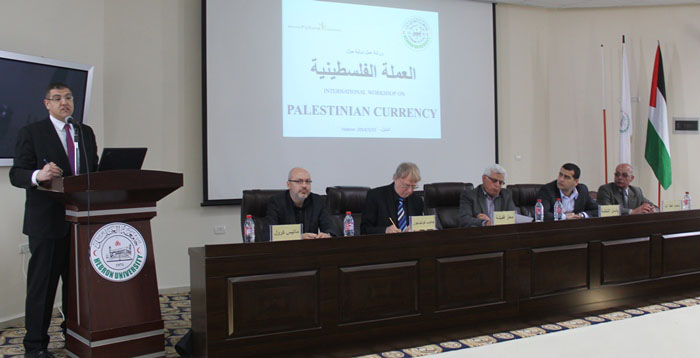News Archive
International Workshop On Palestinian Currency At Hebron University
With the purpose of providing legal and policy guidance to the Palestinian decision-makers, Hebron University College of Law, through its Legal Clinic, in collaboration with the Faculty of Finance and Management, organized an international workshop that dealt with the legal and fiscal requirements for the adoption of currency for the State of Palestine, particularly in the context of recognizing Palestine as a State by the United Nations General Assembly in November 2012. The workshop was opened by Hebron University President, Prof. Ahmad Atawneh, and attended with some 200 people representing ministries, professors, lawyers, NGOs, banks and students.
Speakers at the workshop were Dr. Mutaz Qafisheh, Dean of Hebron University College of Law, “International and Local Legal Framework for Palestinian Currency”; Dr. Basel Natsheh, Dean of Hebron University Faculty of Finance and Management, “Financial and Policy Challenges for Palestinian Currency”; Dr. Jakob von Uexkull, Chair of the Management Board of the World Future Council, London, “Palestinian Currency: International Perspective”; Dr. Matthias Kroll, Senior Researcher at World Future Council, Hamburg, Germany, “Palestinian Currency: A Strategic Step for the Palestinian Economy”; Mr. Mohammad Attallah, Director of Research and Monetary Policies Department at the Palestine Monetary Authority, “Palestinian Preparations for Issuing National Currency”.
One of the main recommendations of the workshop is that the Palestinian authorities should work without delay on the issuance of a national currency which forms a fact on the ground that would enhance Palestine’s sovereignty, despite the obstacles imposed by the Israeli military occupation on the State of Palestine and the restrictions dictated by the Paris Protocol on Economic Relations between Palestine and Israel.
This workshop came within the framework of the mission of the World Future Council to Palestine to discuss with policy makers the potential for printing Palestinian currency. The mission held meetings with the Palestinian Monetary Authority, Ministry of Finance, Ministry of Economy, advisors of the Palestinian President, Prime Minister, negotiators, and the International Quartet, Capital Market, NGOs, banks, the academia, and the Hebron Chamber of Commerce.







